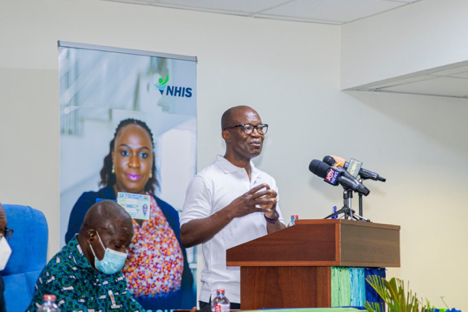The Director of PharmAccess, West Africa, Dr. Kwasi Boahene has said the National Health Insurance Scheme (NHIS) has inspired many countries in Sub-Sahara Africa to offer health services to their population using the Ghana model.
According to him, the government has showed a lot of resilience and commitment to ensuring consistent funding of the NHIS even in difficult times, one of the reasons the scheme remains a strong backbone of the nation’s health service infrastructure.
Dr. Boahene who disclosed this at an event to mark the Nation Health Insurance Authority (NHIA) Data Day said the scheme was impressive because of how it brings together contractors from both the public and private sector to ensure that Ghanaians have access to quality health care.
“The scheme is also inspiring in the way that the NHIA maintains quality assurance and how the board and management of NHIA are committed to using technology to enhance the operations of the scheme”, he added
“Technology is changing the way we do business in Ghana; it is changing far beyond the comprehension of everyone. If you look at sub-Saharan, 10 percent of our GDP transaction occur via mobile money payment compared to 2 percent in European and the United States of America, so now when it comes to digital technology African is leading the group.”, he said
“When you have technology what it means is that you would gather more data and if we analyze the data that we have we get more insight from the Data and the insights can help us to do things best”, he added.
Analytic Data to strengthen NHIS
According to the Country Director of PharmAccess, Dr. Maxwel Antwi, the NHIS is on very a firm footing and is taking bold policy interventions to lead the country towards achieving universal health coverage.
He said currently more than 50 percent of Ghanaians are active members of the National Health Insurance Scheme and it’s a good data set in terms of health statistics that the ministry of health can leverage to influence policy decisions toward achieving quality health coverage.
Based on joint data Analytics put together by NHIA, PharmAccess Foundation and faculty of the University of Ghana Economics Department on the NHIS, Dr. Antwi has recommended that NHIS must move fully to 100 percent electronic claims management and put an end to paper-based claim management.
Also, he said the scheme must focus on managing hypertension, diabetes and other communicable diseases as the data shows patients who were diagnosed with hypertension or diabetes did not come back for a follow-up visit.
“It was realized that in 2019 about 50 percent of those who were first diagnosed with hypertension did not come back for a follow-up visit and treatment. About 150,000 people, we probably want to assume they went for treatment elsewhere, but it was not in the system” he said
He added that the NHIS must focus on preventive health, thus investing in preventive measures to deal with sickness instead of waiting for people to fall sick to give them treatment,
Speaking on PharmAcces’s contribution to NHIS, he said his outfit has supported the NHIS to design accreditation tools that were used to bring hospitals and clinics to join the scheme.
“It also helped NHIS to go paperless. Initially, NHIS receives 3 million paper claims every month and what we have done with them is to help the scheme move from paper-based claims to paperless claims.
Having done that, the NHIS tasked us to look into the claim data to see how it can inform the policy decisions in terms of increasing membership and proving quality care and making sure that the NHIS is sustainable.
What we have done is to focus on Ghana’s national health policy which has key indicators and metrics on what Ghana is focusing on in line with the Sustainable Development Goals. So, with the data the Scheme can help the country achieve universal health coverage by 2030,” he said.










